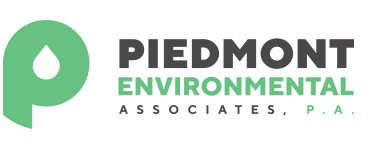Resources
Frequently Asked Questions
You may find yourself in a situation where you are buying or inheriting land. You want to make sure that it percs before you buy it. You may be wanting to divide a lot from the family farm. You’ve heard that you need to make sure the land percs before you buy or spend money on dividing it. You find out that you need to go to the health department only to find out that the health department recommends that you first go to a soil scientist and pay them to evaluate your property. This article is intended to give you some guidance as to when you need a soil scientist and when you do not need a soil scientist to start with.
If you are buying a lot and not changing any of the property lines at all, the health department requires that you stake a house and flag the property lines before they evaluate the lot. Staking the house does not need to be done by a surveyor. You can buy stakes at the hardware store and stake the proposed house location, which may slightly move later. You will then need to prepare a map which can normally be done on the county GIS site. To find the county site you can usually google the county name followed by “GIS” and go to the site. You zoom into the property to be applied for and use the tools button to draw a house in the proximity of where you placed the stakes. You will need to take a copy, printed to scale, with you to the environmental health department where you will finish the application. If the application asks for the septic system types to be checked then check them all. The application fee varies from county to county and usually ranges from $200 to $500 for a four-bedroom house.
You can ask the health department when they anticipate on visiting your site in order to get an idea as to when they will perform the evaluation. If the closing date is before the estimated soil evaluation date, the closing date will need to be extended. We recommend that the due diligence on a lot requiring a septic system be at least 60 days. If the lot passes the inspection, you have spent about $400 and you know that the lot can be built upon.
Had you first used a soil scientist in this situation you would have paid the soil scientist between $400 and $800 for their opinion then you would have had to make an application and go through the permitting process. The soil scientist does not normally replace the permitting process. If you purchase the lot based on the soil scientist’s evaluation, then you have purchased an opinion and not a guarantee. I have illustrated to many clients in the past by saying, “I can only guarantee you that I am right! I can’t guarantee that anyone will agree with me.”
In a situation where you are dividing a lot from a larger parcel you must take into consideration the expense of dividing the lot. The health department will not evaluate the tract until the surveyor takes the proposed lot through the preliminary platting process. The field and office work required by the surveyor may be around $2,000. To incur this expense without knowing that the lot has usable soils is a risk. In this case it may be better to employ the soil scientist to make sure the proposed lot will be permitted before the surveyor spends their time and effort to create the lot. This is especially true if you are in an area notorious for soils that are not usable for septic systems.
In the past, if the soil scientist concluded that the lot was usable, and the health department disagreed then the soil scientist and the owner had to go through an appeal process. Today there are options which include an evaluation named after the house bill which gave birth to the regulation. We call this evaluation a HB 114, which allows a soil scientist to evaluate the lot and convey the findings to the health department. The health department only reviews the report and does not perform a field evaluation at all. The health department issues the Improvements Permit based on the work of the soil scientist.
The cost of the HB 114 evaluation is more expensive because the liability of the evaluation is now passed to the private sector who is required to have a $2,000,000 insurance policy in place. The range of the HB 114 evaluation per lot is between $600 and $1200. You must also pay the local health department their normal fee of around $400. This evaluation can get expensive compared to the normal cost of just using the local health department. This method is mainly used when time is of the essence or when there is a difference of opinion concerning the soils on a lot.
